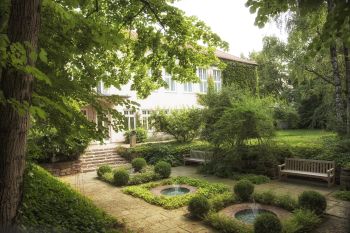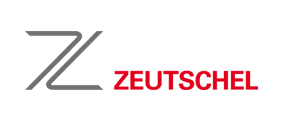May 2017 - Orff digital: Preserving and making historical collections accessible
|
The Orff Center Munich was founded in 1990. The key mission of the center is “to encourage the active study of the life and works of the composer Carl Orff'”. The center collects, maintains and archives documents on Carl Orff (1895-1982). The estate’s existence is thanks to the foresight of the composer and the commitment of his wife Liselotte (1930-2012). The Bavarian State Library will keep the fair copies of his works – the original handwritten scores – for reasons of conservation. The entire documentary components and a large proportion of Carl Orff’s artistic estate are located in the archives of the Orff Center Munich and on permanent loan from the Carl Orff Foundation. |
 |
Garden side of Orff-Zentrums Munich© Orff-Zentrum Munich |
These include personal documents such as certificates, diplomas, diaries, calendars and documents on his work, handwritten notes and drafts of text for lectures and essays. Around 650 portraits, rehearsal, stage and performance photos are stored in the photo archives. The collection of sketches fills around 100 folders and contains autograph designs by Orff for his stage work, orchestral and chamber music as well as his songs.
Another mission of the Orff Center is to open up the collection and archive material and make it available for a variety of purposes, including research, theater and music practice as well as for music education and media. Digitization is a key element of this.

Perforation Outline of a calender © Orff-Zentrum Munich
Documenting, cataloging and preserving
The project: The digitization project in the Orff Center pursues two main objectives: the first is to backup the data and the second is to perform a reasonable initial cataloging. The majority of photos will be used in collection documentation for in-house and scientific purposes. Only a small portion of this digitized media will be created with a view to publication, and only after the explicit consent of the rights holder.
The duration of the project, which started in 2014, is approximately five years and is supervised by a full-time member of staff. This includes all the activities required in a digitization workflow of cultural property in accordance with DFG practice rules: planning, conservation review, digitization, quality control, storage, initial cataloging and administration, imaging, preparation and use, long-term archiving.
Originals and manuscripts that are unique pieces and of high cultural value have been assessed and surveyed in advance in order to select the right recording process for digitization. The aim was to prepare the digitized media in such a way that a reasonable initial cataloging and the corresponding imaging create a basis that is as ideal as possible for scientific in-depth cataloging at a later stage.
The hard and software: scanners are to be used for the protective digitization (color overhead scanners OS 10000 A 1 and OS 15000 Advanced Plus A 3 plus from the ZEUTSCHEL company) as well as a digital camera. The Orff Center has opted to use the open-source software KITODO for production processes and imaging of the digitized media.
All file formats used by the Orff Center are typical standard formats. This also applies to the METS/MODS format of the xml-files, which has established itself as the current standard for describing (structure and metadata) digitized media.
In protective digitization, the facsimile page images of the respective archival category are retained as a result of the scanning process. Individually accessible, they are generally independent of all subsequent processing steps (e.g. allocation of structure elements and metadata) and other units of information, and stored and displayed as originals (raw data, 400 dpi). An automatic and server-independent backup of the digitized media is conducted in-house by means of a NAS system and externally in the IT service center of the Free State of Bavaria.
Storage and use: Some of the units in the collection will have precision-made dielines made from acid-free paper designed for the packaging (covers) and inserts, printed with key information on the digitized media and a bar or QR code. The Orff Center will shortly be furnishing the scientists with tablets for research purposes. This will allow them to move around the building freely (the estate is stored in different places) and to control the desired archive records by means of a QR code in the Kitodo.Presentation.
*****
Orff Center Munich
State Institute for Research and Documentation
Jan Adamiak, Project Manager Digital Initial Cataloging and Internal Protective Digitization of the Documentary and Artistic Estate of Carl Orff
Kaulbachstrasse 16, D-80539 Munich
Tel 0049 / 89 / 288105-0
Fax 0049 / 89 / 288105-33
kontakt@orff-zentrum.de
www.orff-zentrum.de
Kitodo
Kitodo is a software package for digitization projects in libraries, archives, museums and documentation centers. The software maintained by the Kitodo Association is open-source, platform independent, multi-client compatible and license-free. The main components of Kitodo.Production and Kitodo.Presentation are suitable for different digitization strategies. Kitodo.Presentation is implemented as an extension of the free content management system TYPO3 and seamlessly integrates into editorially maintained websites. TYPO3 functions such as user authentication, session handling, language localization etc., are also fully available within the function modules of Kitodo.Presentation. This flexibility allows scalable business models for any company size, commercial services, work-sharing collaborations or purely in-house projects. The Orff Center Munich benefits from joint development in an open-source community. This gives smaller institutions the opportunity to leverage new functionalities and system extensions without having to provide their own development capacities for this. Kitodo.Production is currently being revised and updated as part of a DFT project to optimize the architecture and user interface.
See www.kitodo.org for more information and http://www.zeutschel.de/en/produkte/workflowloesungen/Kitodo.html
Zeutschel GmbH
Zeutschel assists libraries, archives and museums in setting up and executing their digitization processes. The appropriate scanners are set-up along with the appropriate workflows and presentation options, based on the open-source system Kitodo. Systems training sessions were also held in the Orff Center Munich so that the institution could achieve the greatest possible autonomy in running Kitodo. High priority was given to establishing the collection’s structure and metadata to meet the objectives of a user-oriented quick search and targeted results. The high flexibility of Kitodo means that it is also possible to map individual requirements. The Orff Center has taken out a maintenance contract for support, bug fixes and software updates. Zeutschel also ran training courses on color management outside Kitodo so that the best possible image quality could be achieved.
Zeutschel GmbH
Michael Luetgen, Sales Manager Software Solutions
Member of Kitodo e.V. (Board of Directors)
Heerweg 2, D-72070 Tübingen-Hirschau
Tel 0049 / 7071 / 9706-0
info@zeutschel.de
www.zeutschel.de
